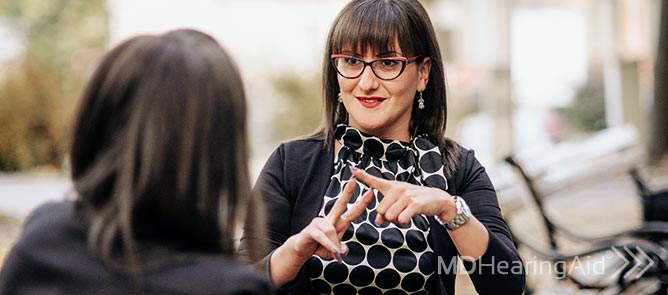April is National Deaf History Month, when Deaf people reflect on advocacy and celebrate their community. Unfortunately, there are still many misconceptions about general hearing loss compared to deafness. What does it mean for a person to be hard of hearing? What does it mean for a person to be deaf? Is there any overlap? What do hard of hearing people need to do to help their condition?
What is considered deafness?
There are four general ranges of hearing loss – mild, moderate, severe, and profound. People who are deaf are in the profound hearing loss category, meaning they have little to no usable hearing left. Deafness can be related to birth issues, later illness, or physical trauma. Age-related hearing loss that starts off mild can escalate to profound over time.
Note: there is a big difference between deaf and Deaf. Deaf with a capital “D” is used for the people within Deaf community, with their own language, history, and culture. Deaf with a small “d” is a term often used to define profound hearing loss (or that hearing loss can’t be assisted by amplification for whatever reason).
When talking about Deaf people, it’s important to recognize the long history of Deaf Rights Advocacy in America. The first versions of sign language can be traced back to the 1700s. The National Association of the Deaf was founded in 1890 to protect the rights of Deaf Americans and their independence. Multiple pieces of 20th Century legislation, including the 1990 Americans with Disabilities Act, were created to help protect the Deaf community. These laws are unevenly enforced by individual employers, and the Deaf community continues to push for stricter rules to protect people with disabilities.
What are options for Deaf people?
Some Deaf people chose not to use any assistive technology while others chose to wear hearing aids or cochlear implants. Specialized hearing aids are available for some forms of profound hearing loss. Cochlear implants are another option. Unlike hearing aids whose receiver sits in the middle ear, the cochlear implant’s receiver-stimulator is surgically implanted in the temporal bone and sends an electrical signal through the inner ear to the brain. This is a serious, expensive surgical procedure, and candidates are generally only approved if they 1. have moderately severe to profound hearing loss and 2. haven’t had good results with hearing aids up to this point.
Technology has also assisted Deaf people in navigating a hearing world. The teletypewriter (TTY), created in the 1960s and used nationwide by the 1990s, allowed for people with profound hearing loss to easily use telephones for the first time by offering text transcripts in real time. Closed captioning is also relatively new, but is now a crucial part of the Deaf community’s ability to enjoy media. There are also some movie theaters that offer special closed captioning for certain screens. While more can and should be done to help those in the Deaf community enjoy simple luxuries like these, it’s encouraging to see improvements being made. For instance, concerts and other events hiring sign language interpreters can make the event accessible for the Deaf community.
It’s important to remember that Deaf agency goes beyond advanced technology. Learning sign language is often a key part of being able to communicate as a Deaf person, as well as reading lips. Deaf culture is about the right to choose, and many Deaf people prefer using sign language as their main form of communication.
What if I can still hear kind of okay?
There are many types of hearing loss that aren’t specifically deafness. Generally, people within the mild to severe range — compared to profound — can be considered hard of hearing.
That said, there can be an overlap between the two groups. Many people with severe (but not profound) hearing loss are part of the Deaf community, and others whose hearing loss is profound prefer the hard of hearing label. When discussing the nuances of the Deaf community, it’s also important to understand that the term hearing impaired isn’t necessarily considered offensive, but it is antiquated. While it was used throughout the late 20th Century, “hearing impaired” is generally not used to describe people with hearing loss anymore.
What solutions are available for the hard of hearing?
Treatments vary depending on what kind of hearing loss you have, especially when it comes to conductive hearing loss. That said, using hearing aids is among the most common treatments. While hearing devices can’t cure hearing loss, they can help bring your hearing to a more comfortable level and help muffled sounds become clearer. They can also relieve you of the mental strain it takes to concentrate on conversations when your surroundings sound muffled.
Do I really need hearing aids if I’m not deaf?
Here’s the thing: even if you have very mild hearing loss, you might need hearing aids. Did you know only one in five people with hearing loss who could benefit from wearing a hearing aid actually use one?
There’s a real stigma against buying hearing aids since they’re seen as a weakness or a sign of getting old. But hearing aids are a way to help you live a full and exciting life at any age. There’s nothing weak about reclaiming your freedom.
But it’s not just about the age stigma. Too often, people with hearing loss avoid buying hearing aids because they see the hearing clinic’s outrageous prices. If you convince yourself the problem “isn’t that bad,” it’s easy to decide that buying hearing aids is something you can put off.
Unfortunately, you’d be shocked at how much you’re missing even with mild hearing loss. Even if you think you can put off buying hearing aids, there are many aspects of your quality of life connected to your hearing. John Hopkins ran a study about the connections between Alzheimer’s and hearing loss, and inner ear issues like hearing loss can add to vertigo and other balance problems. That’s why MDHearing wants to help.
MDHearing specializes in hearing aids for mild to moderately severe hearing loss. Since we focus just on that range, we’re able to be very efficient in our development and manufacturing. That allows us to provide high-quality hearing aids at a fraction of the cost you’ll see at the audiologist or hearing clinic. The company was founded on the belief that hearing aids shouldn’t cost you a fortune, and we want you to be able to afford the medical devices you need.
Each of our doctor-designed, FDA-registered hearing aids come with a risk-free, 100% satisfaction guarantee. Start your trial today!
CHOOSE YOUR NEW HEARING AID


